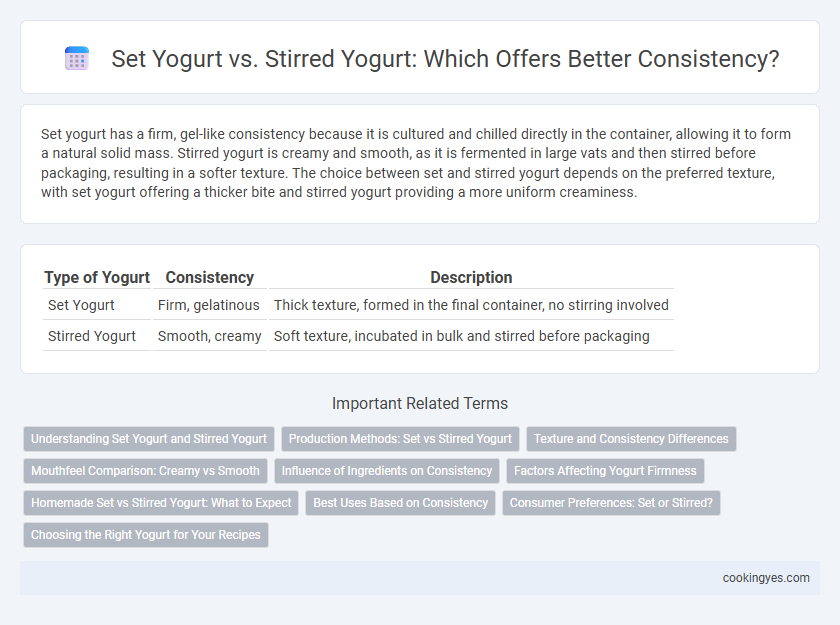Set yogurt has a firm, gel-like consistency because it is cultured and chilled directly in the container, allowing it to form a natural solid mass. Stirred yogurt is creamy and smooth, as it is fermented in large vats and then stirred before packaging, resulting in a softer texture. The choice between set and stirred yogurt depends on the preferred texture, with set yogurt offering a thicker bite and stirred yogurt providing a more uniform creaminess.
Table of Comparison
| Type of Yogurt | Consistency | Description |
|---|---|---|
| Set Yogurt | Firm, gelatinous | Thick texture, formed in the final container, no stirring involved |
| Stirred Yogurt | Smooth, creamy | Soft texture, incubated in bulk and stirred before packaging |
Understanding Set Yogurt and Stirred Yogurt
Set yogurt features a firm, custard-like consistency achieved by fermenting milk directly in the container without stirring, preserving the natural gel structure. Stirred yogurt is produced by fermenting the milk in large vats and then mechanically agitating it to create a smooth, creamy texture with a more uniform consistency. Understanding these production methods highlights the key difference in texture and mouthfeel, with set yogurt offering a denser form and stirred yogurt providing a lighter, spoonable experience.
Production Methods: Set vs Stirred Yogurt
Set yogurt is produced by fermenting milk directly in its final container, resulting in a firm, gel-like consistency due to minimal disturbance during the thickening process. Stirred yogurt undergoes fermentation in large vats before being vigorously mixed to achieve a creamy, smooth texture with a less solid structure. Production methods impact the yogurt's mouthfeel and viscosity, making set yogurt denser and stirred yogurt more fluid and scoopable.
Texture and Consistency Differences
Set yogurt has a firm and smooth texture due to being cultured and set directly in its container, resulting in a gelatinous consistency that holds shape well. Stirred yogurt is creamy and softer, as it is fermented in bulk and then mixed, creating a more homogeneous and easily spoonable texture. The choice between set and stirred impacts mouthfeel and how yogurt blends in recipes or pairs with toppings.
Mouthfeel Comparison: Creamy vs Smooth
Set yogurt offers a creamy, firm texture due to its undisturbed fermentation in molds, resulting in a rich mouthfeel that holds shape well. Stirred yogurt has a smooth, fluid consistency achieved by mixing after fermentation, providing a lighter, more velvety sensation on the palate. Choosing between set and stirred yogurt depends on preference for either a dense creaminess or a silky smooth texture.
Influence of Ingredients on Consistency
Set yogurt achieves its firm, gel-like consistency through fermentation directly in the container, where milk proteins form a stable network influenced by higher fat content and specific starter cultures. Stirred yogurt has a smoother, creamier texture created by breaking the coagulated mass post-fermentation, with added stabilizers like pectin and gelatin enhancing its viscosity and preventing whey separation. The presence of milk solids, fat percentages, and types of bacterial cultures critically affect protein matrix formation, directly impacting the thickness and mouthfeel in both yogurt types.
Factors Affecting Yogurt Firmness
Set yogurt exhibits a firm, gel-like consistency due to fermentation occurring directly in the packaging, which allows the milk proteins to form a strong network. Stirred yogurt undergoes agitation after fermentation, resulting in a smoother, softer texture with reduced firmness. Factors affecting yogurt firmness include milk protein content, incubation temperature, fermentation time, and the method of milk treatment prior to fermentation.
Homemade Set vs Stirred Yogurt: What to Expect
Homemade set yogurt forms a thick, firm consistency as it coagulates undisturbed, creating a solid gel-like texture ideal for slicing or scooping. Stirred yogurt, by contrast, is gently mixed after fermentation, resulting in a creamy, smooth texture that is easy to pour and blend into recipes. Expect homemade set yogurt to have a dense structure and tangy flavor, while homemade stirred yogurt offers a softer mouthfeel with a consistent, velvety appearance.
Best Uses Based on Consistency
Set yogurt has a firm, gel-like consistency ideal for slicing, making it perfect for parfaits and layered desserts where structure is key. Stirred yogurt offers a creamier, smoother texture, suited for smoothies, dips, and sauces that require easy blending or spooning. Choosing between set and stirred yogurt depends on whether a firm texture or creamy consistency best complements the recipe's desired presentation and mouthfeel.
Consumer Preferences: Set or Stirred?
Set yogurt features a firm, gel-like consistency formed directly in the container, appealing to consumers who prefer a spoonable texture without mixing. Stirred yogurt offers a smoother, creamier texture achieved by homogenizing the curd after fermentation, favored by those desiring a spreadable or drinkable option. Consumer preferences often hinge on texture and convenience, with set yogurt popular for individual servings and stirred yogurt preferred for versatility in recipes and smoothies.
Choosing the Right Yogurt for Your Recipes
Set yogurt offers a firm, gel-like texture ideal for slicing or layering in desserts and parfaits, maintaining its shape well in recipes requiring structure. Stirred yogurt has a smooth, creamy consistency that blends easily with fruits and flavorings, making it perfect for sauces, dips, or smoothies. Selecting the right yogurt depends on the desired texture and application, with set yogurt enhancing visual presentation while stirred yogurt ensures easy mixing and a silky mouthfeel.
Set Yogurt vs Stirred Yogurt for Consistency Infographic

 cookingyes.com
cookingyes.com